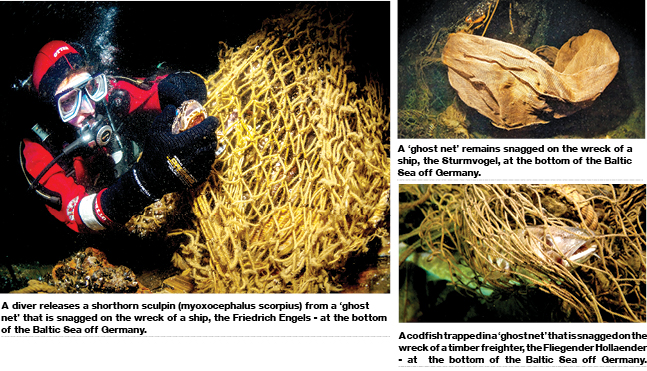

They are covered with mussels and algae and lie like veils over shipwrecks, lost anchors and large rocks on the seabed. They are fishing nets, which have either been lost or discarded. ”Synthetic nets have been used to fish the seas for 60 years now,” said Thomas Foerster, Chairman of Archaeomare, a German marine research institute specialising in the Baltic Sea. “In contrast to earlier nets, the nylon ones don’t rot and have accumulated as obstacles.” Archaeomare divers, in co-operation with the German Oceanographic Museum (DMM) in Stralsund and the Worldwide Fund for Nature (WWF),
dived down to 28 wrecks around the German Baltic Sea island of Ruegen last year. What they saw was alarming. ”Nets were snagged on all of the wrecks that we dived to,” said
Foerster, who is also on the DMM staff. The marine biologists suspect that the situation is similar in other heavily fished areas of theBaltic. Lost or discarded fishing nets, known as ‘ghost nets’, are part of the trash problem in all of the world’s oceans and seas. According to WWF estimates, about a tenth of global ocean trash - 640,000 tons - consists of such nets. The WWF believes that between 5,000 and 10,000 nets, or parts thereof, end up in the Baltic Sea annually, said Jochen Lamp, Head of the conservation organisation’s Baltic office. Foerster’s estimate is more conservative: a few thousand nets. “We
don’t really know how many nets are lost each year,” he said. As yet there is no requirement to report lost nets. The derelict nets, along with lost ship cargo and plastic trash from beaches and rivers, are among the detritus of civilisation accumulating in the oceans. They pose a constant danger to the marine environment, as they continue to trap sea life.
”We’ve found cod, flounder and bullhead in the nets, particularly on winter dives,” Foerster said. The fish apparently seek shelter in shipwrecks during the cold months, and the nets then become death traps. According to Germany’s Federal Environment Agency, it can take about
450 years for a plastic product to degrade in the environment. Larger pieces are gradually ground down to tiny particles, which are ingested, along with their toxic additives such as softeners, by mussels and plankton - and thereby enter the food chain. Germany’s Federal Maritime and Hydrographic Agency (BSH) has detected ’ghost nets’ on about 100 underwater obstacles off Germany’s Baltic coast. DMM experts believe the number to be much higher, because the BSH only documents nets that are potentially hazardous to shipping.
All available charts and findings from dives off Ruegen and Usedom are currently being collated, Foerster said, including ‘hang-up’ charts of obstacles on which fishermen have lost nets in recent decades. Late this summer, Archaeomare, the WWF and DMM plan to start recovering ‘ghost nets’ off Germany’s Baltic coast. Environmentalists in Poland have shown that the haul from such operations can be impressive.
”Our WWF colleagues retrieved about six tons of nets from shipwrecks and from the seabed during just 20 days at sea,” Lamp noted. Apart from divers, mesh harrow were also used to drag the seabed. Marine biologists and environmentalists have called for fishing net to be equipped with acoustic detection devices so that they can be more easily located and retrieved. “The retrievability of the nets is key,” Lamp remarked. Without it, he said, getting a grip on the problem, which is growing each year, is impossible. A special DMM exhibition titled ‘Ghost Nets’ is currently acquainting museum-goers with the problem. Among other things, it shows a bird cliff on the German North Sea island of Helgoland. ”The gannets there no longer build their nests with seaweed, but increasingly with remnants of synthetic fishing nets!” Foerster said.υ
Read More...